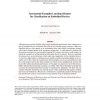Free Online Productivity Tools
i2Speak
i2Symbol
i2OCR
iTex2Img
iWeb2Print
iWeb2Shot
i2Type
iPdf2Split
iPdf2Merge
i2Bopomofo
i2Arabic
i2Style
i2Image
i2PDF
iLatex2Rtf
Sci2ools
122
click to vote
ML
2008
ACM
2008
ACM
Incremental exemplar learning schemes for classification on embedded devices
Although memory-based classifiers offer robust classification performance, their widespread usage on embedded devices is hindered due to the device's limited memory resources. Moreover, embedded devices often operate in an environment where data exhibits evolutionary changes which entails frequent update of the in-memory training data. A viable option for dealing with the memory constraint is to use Exemplar Learning (EL) schemes that learn a small memory set (called the exemplar set) of high functional information that fits in memory. However, traditional EL schemes have several drawbacks which make them inapplicable for the embedded devices; (1) they have high memory overheads and are unable to handle incremental updates to the exemplar set, (2) they cannot be customized to obtain exemplar sets of any user-defined size that fits in the memory and (3) they learn exemplar sets based on local neighborhood structure that do not offer robust classification performance. In this paper...
| Added | 13 Dec 2010 |
| Updated | 13 Dec 2010 |
| Type | Journal |
| Year | 2008 |
| Where | ML |
| Authors | Ankur Jain, Daniel Nikovski |
Comments (0)

